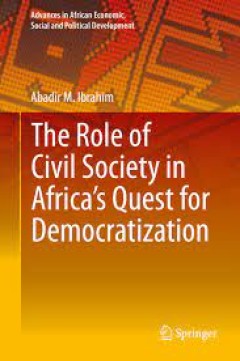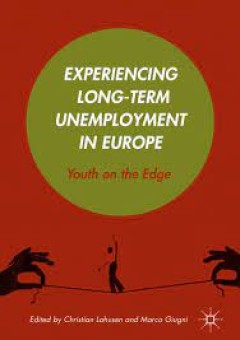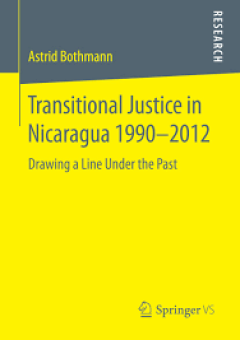Filter by

The Role of Sport in Health-Related Promotion of Physical Activity The Persp…
Enrico Michelini illustrates that sport plays a very marginal role in the contemporary health promotion. This is the main result of the present analysis of national strategies for the promotion of physical activity issued by the health ministries of France, Germany, and Italy. All these health-strategies are rather ambiguous on this subject: They mention sport systematically as an abstract term…
- Edition
- -
- ISBN/ISSN
- 978-3-658-08188-1
- Collation
- -
- Series Title
- -
- Call Number
- -

The Role of Civil Society in Africa’s Quest for Democratization
This book tests many of the assumptions, hypotheses, and conclusions connected with the presumed role of civil society organizations in the democratization of African countries. Taking a comparative approach, it looks at countries that have successfully democratized, those that are stuck between progress and regression, those that have regressed into dictatorship, and those that are currently i…
- Edition
- -
- ISBN/ISSN
- 978-3-319-18383-1
- Collation
- -
- Series Title
- -
- Call Number
- -

Nuclear Waste Governance:An International Comparison
This volume examines the national plans that ten Euratom countries plus Switzerland and the United States are developing to address high-level radioactive waste storage and disposal. The chapters, which were written by 23 international experts, outline European and national regulations, technology choices, safety criteria, monitoring systems, compensation schemes, institutional structures, and …
- Edition
- 1
- ISBN/ISSN
- 978-3-658-08961-0
- Collation
- XXII, 327
- Series Title
- Energiepolitik und Klimaschutz. Energy Policy and Climate Protection
- Call Number
- -

The Politics of Budgetary Surplus
This book probes the hollow rhetoric of debt, deficits and austerity. It explores the decisions of parties of the left which have attempted to deflect criticisms of economic mismanagement and gain trust by depoliticising the budget process and financial management with various rules, albeit with elements of discretion. The book argues that this is a perverse form of trust as it is premised on t…
- Edition
- -
- ISBN/ISSN
- 978-1-137-58597-4
- Collation
- XV, 187
- Series Title
- -
- Call Number
- -

World Political Challenges Political Issues Under Debate - Vol. 3
This volume focuses on several theoretical topics in world politics and analyzes prominent cases of global conflicts and their potential peaceful resolution. It covers issues such as the multiplication of nation states in the era of globalization, failed peace policy concepts in the 20th century, and the question of who was to blame for the outbreak of the Great War. The author discusses three …
- Edition
- -
- ISBN/ISSN
- 978-3-662-47912-4
- Collation
- -
- Series Title
- -
- Call Number
- -

Experiencing Long-Term Unemployment in Europe
This book examines the everyday-life patterns of young adults under circumstances of vulnerability and precariousness. Its main focus is on the web of social relations that structure the everyday life of young people, for instance by providing resources and tools of solving problems, exerting pressures and voicing expectations, and shaping the person’s self-conception, identity, and well-bein…
- Edition
- -
- ISBN/ISSN
- 978-1-137-50487-6
- Collation
- XVI, 233
- Series Title
- -
- Call Number
- -

Evaluating e-Participation Frameworks, Practice, Evidence
There is a widely acknowledged evaluation gap in the field of e-participation practice and research, a lack of systematic evaluation with regard to process organization, outcome and impacts. This book addresses the state of the art of e-participation research and the existing evaluation gap by reviewing various evaluation approaches and providing a multidisciplinary concept for evaluating the o…
- Edition
- -
- ISBN/ISSN
- 978-3-319-25403-6
- Collation
- 13 b/w illustrations, 26 illustrations in colour
- Series Title
- -
- Call Number
- -

Transitional Justice in Nicaragua 1990–2012
Astrid Bothmann examines historical, political and socioeconomic factors that explain the absence of transitional justice in Nicaragua from 1990 to 2012. The author provides the first systematic analysis of the reasons for the lack of transitional justice in Nicaragua after the end of the Sandinista regime and the civil war (1990). Contrary to other Latin American states of the third wave of de…
- Edition
- 1
- ISBN/ISSN
- 978-3-658-10502-0
- Collation
- XIV, 320
- Series Title
- -
- Call Number
- -

German Domestic and Foreign Policy
This volume analyses current German domestic and foreign policy debates of international relevance. By reflecting their contemporary historical background and discussing the logic behind the different positions in a dispute, the author considers issues such as whether Muslim women should be allowed to wear headscarves, fears about immigration, the predominance of either a single national cultur…
- Edition
- -
- ISBN/ISSN
- 978-3-662-47928-5
- Collation
- X, 246
- Series Title
- -
- Call Number
- 351.819 GER

Eradicating Terrorism from the Middle East Policy and Administrative Approaches
This book analyzes the contributing factors responsible for the emergence of terrorism in the Middle East with specific case studies based on empirical data that anchors the analyses in real life observation and posits unbiased, bipartisan solutions. Terrorists are targeting civilian populations around the world and increasing pressure on civil liberties, public policy and democratic institutio…
- Edition
- -
- ISBN/ISSN
- 978-3-319-31018-3
- Collation
- 11 b/w illustrations, 5 illustrations in colour
- Series Title
- -
- Call Number
- -
 Computer Science, Information & General Works
Computer Science, Information & General Works  Philosophy & Psychology
Philosophy & Psychology  Religion
Religion  Social Sciences
Social Sciences  Language
Language  Pure Science
Pure Science  Applied Sciences
Applied Sciences  Art & Recreation
Art & Recreation  Literature
Literature  History & Geography
History & Geography